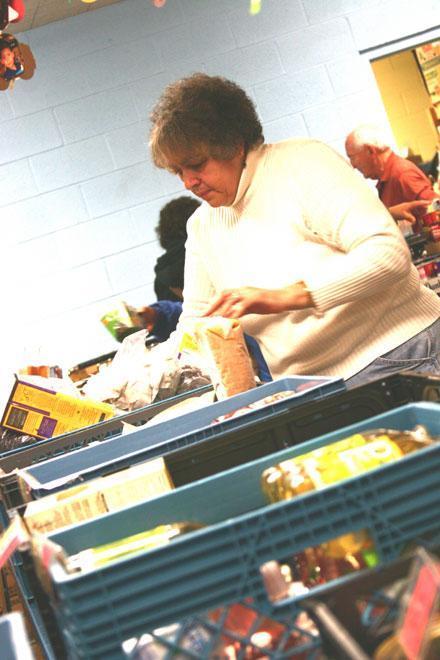Need is up but donations down at local food banks
Des Moines Food Bank volunteer Sophia Morella distributes food in the basement of the Des Moines Methodist Church where the food bank is located.
Mon, 12/08/2008
Local food banks say they have been supplying food to the largest number of people they have seen in years.
The Des Moines Food Bank fed more than 600 families in the three days it was open before Thanksgiving.
"Everybody got fed. We didn't run out of food," said Des Moines Food Bank director Kris Van Gasken.
But she said they did not have as many food donations this year as they normally receive.
More than volunteers, the food bank needs food and cash donations, Van Gasken noted.
"We can always use volunteers, but right now with the increase of people, we are needing more food, so donations of food or money are the biggest help for us," Van Gaskin said.
The number of people getting food from the Des Moines Food Bank is up over 30 percent from last year.
Normally this time of year the food bank would be serving 65 to 70 families every day it's open. Now, Van Gasken said, they are averaging around 100. She added that 40 percent of those served are children.
"It takes the whole community working together to feed this many people," Van Gasken added.
The number of people who come in usually goes down during the summer but that didn't happen this year, Van Gasken noted.
"People have a lot more expenses when it starts getting cold, they have to pay for electricity, they have just bought school clothes and school supplies and then there is Christmas and Thanksgiving, so there are just a lot more expenses this time of year," Gasken said.
Mike Werle, director of the Burien-Highline Food Bank said the food banks are suffering along with the economy.
The Burien-Highline Food Bank is now getting requests from 85 families a day, up from 65, and Werle said they simply cannot meet the demand.
At Tukwila Food Pantry, the number of people they serve has gone up 13 percent this year.
In October, the Tukwila pantry usually serves around 740 families. This year they served over 900, and director Joe Pice said they were pushing it already.
Pice said he has seen people from all over the social spectrum coming in.
"It's not just the poor and needy, it is people who have had a family crisis with this economic downturn coming to us," Pice said.
He said their food donations have been able to sustain them so far, but their cash donations have gone down drastically while their operating costs have continued to increase.
The Tukwila Food Pantry is currently behind $30,000 to $40,000.
Fuel costs to pick up food and bring it to the food bank have gone up to over $10,000, Pice said.
The food banks receive state and city support. The Des Moines Food Bank receives money from the cities of Des Moines and SeaTac; the Tukwila Food Pantry receives money from Tukwila, SeaTac and Burien.
However, Pice said they rely on individual donors to support their operation.
"Everybody is hurting, this crisis has touched everybody's pocket book, but we need to make sure we look out for people," Pice said.
Van Gasken said if you look at a food bank as a business it is run on very little money. Most of their food is donated and the work done by volunteers.
The Des Moines Food Bank usually has 200 volunteers, Van Gasken said, which is the equivalent of over 20 full time employees.
Des Moines has two part time employees and Tukwila has one and a half.
"If you don't add labor costs in, if you just count the food, we are like a $2 million business run on $2,000," Van Gasken said.
Food banks serving the area are Burien-Highline Food Bank, 206-433-9900, www.myfoodbank.org;
Tukwila Food Pantry, 206-431-8293, www.tukwilapantry.org; Des Moines Food Bank, 206-878-2660, www.myfoodbank.org and White Center Food Bank, 206-762-2848, www.whitecenterfoodbank.org.


